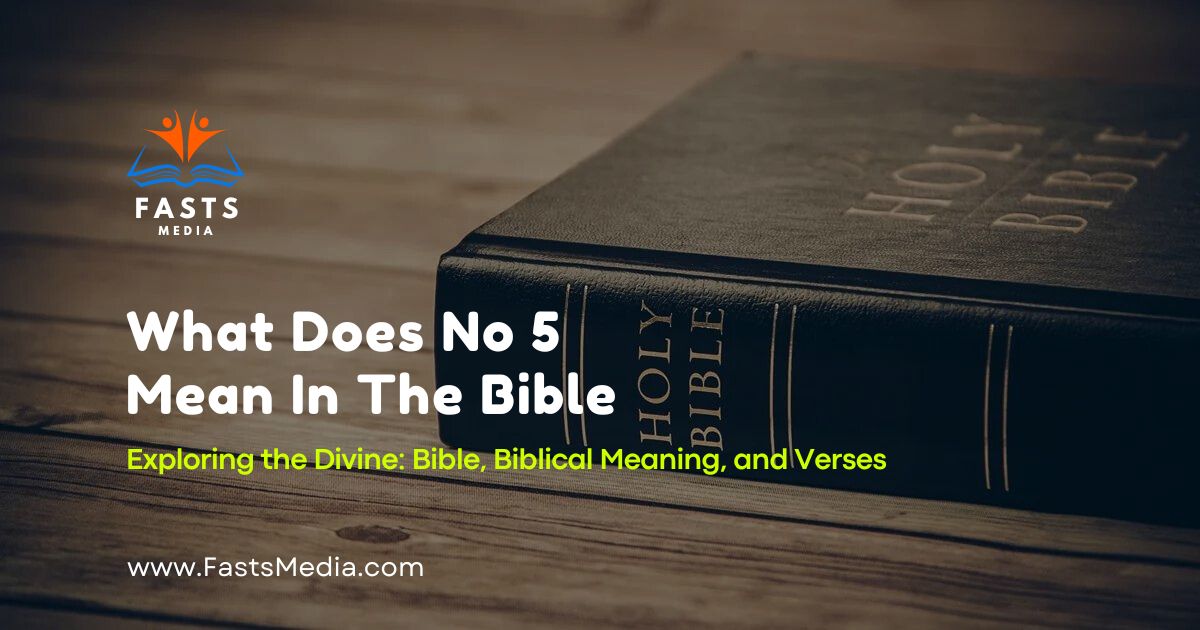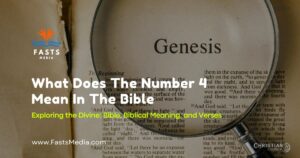The Number 5 in the Bible often represents God’s grace and favor toward humanity. It is seen as a symbol of balance and divine provision throughout the scriptures.
Curious about What Does No 5 Mean In The Bible? It’s more than just a digit; it symbolizes God’s grace and divine favor, reflecting balance and the provision of the Almighty. Discover its deeper significance in the scriptures!
In the Bible, 5 often symbolizes God’s grace and goodness. It is seen as a representation of the balance between justice and mercy. The number appears frequently, pointing to divine favor and provision. Discover its unique role in biblical teachings.
Meaning of Numbers: The Number 5
The number 5 in the Bible represents God’s grace and divine favor. It symbolizes balance, with five fingers on each hand and five toes on each foot. This number shows how God provides and cares for His people. It appears in many stories, reflecting moments of protection and blessing. The number 5 is a sign of hope and harmony in biblical teachings.
What is chain,s Genealogy?

The number 5 in the Bible often symbolizes God’s grace, goodness, and favor toward humanity. Since 5 represents grace, multiplying it by itself gives 25, which signifies “grace upon grace.” As John the Baptist testified, “He that cometh after me is preferred before me: for he was before me. And of his fullness have all we received, and grace for grace” (John 1:15-16, KJV).
Jesus was likely born in the fall of 5 B.C., possibly on Saturday, September 2, a special day that was both the weekly Sabbath and the Feast of Trumpets (Rosh Hashanah)—this day marked the beginning of the Hebrew civil year 3757. The Ten Commandments are divided into two sets of 5, with the first focused on our relationship with God and the second on our relationships with others.
Appearances of the Number Five
The number five appears often in the Bible, symbolizing God’s grace and favor. It is seen in the Ten Commandments, divided into two sets of five. The first set focuses on our relationship with God, while the second deals with our relationships with others. This division shows a balance between divine love and human interaction. The number also appears in the Five Wise and Five Foolish Virgins parable, highlighting the importance of being prepared for God’s kingdom.
Jesus’ birth in the fall of 5 B.C. holds special significance due to the number’s symbolism. Born around September 2nd, His birth aligned with both the weekly Sabbath and the Feast of Trumpets. This day marked a new beginning in the Hebrew calendar, symbolizing a new era of grace. The number five here represents the arrival of God’s favor through Jesus Christ, bridging the Old and New Covenants.
There are also five primary offerings commanded by God in the Old Testament: Burnt, Sin, Trespass, Grain, and Peace Offerings. Each offering reflects a unique way to seek God’s grace and favor. The number five connects these practices to a deeper spiritual meaning, showing that divine mercy is present in many aspects of worship. Together, these examples underline how the number five represents God’s abundant grace in various forms.
The Number 5 and God’s Tabernacle

The number 5 in God’s Tabernacle symbolizes His grace and divine favor woven throughout its design. From the five pillars at the entrance to the sacred offerings, this number represents God’s plan of mercy. It highlights the balance between justice and forgiveness in worship.
The Number 5 in the Tabernacle’s Design
The number 5 is woven throughout the design of the Tabernacle, reflecting God’s plan of grace and favor. The structure included elements measured in multiples of five, such as the five pillars at the entrance. These pillars represent the gateway to divine presence, reminding believers of God’s grace. The Tabernacle’s curtains, which were crafted in sets of five, also symbolize protection and mercy. Every detail points to God’s careful design.
The Five Pillars of the Tabernacle Gate
At the entrance of the Tabernacle stood five pillars, symbolizing the doorway to God’s holy presence. This number signifies a bridge between the divine and the human realms. These pillars, made of acacia wood and overlaid with gold, reflect strength and grace. The number five here emphasizes the grace required to approach God. They are a constant reminder of the grace extended to those who seek Him.
The Five Components of the Tabernacle Curtains
The Tabernacle curtains were divided into sets of five sections, highlighting the theme of divine protection. These sections were skillfully woven, symbolizing God’s covering over His people. The five sections signify the layers of grace given to believers. They served as a barrier from the outside world and a symbol of God’s shelter. The number five in this context represents safety under God’s watchful care.
Five Sacrificial Offerings in the Tabernacle
In the Tabernacle, God commanded five types of offerings: Burnt, Grain, Peace, Sin, and Trespass. Each offering provided a unique way for the Israelites to seek God’s mercy and favor. The number five connects these offerings to a deeper understanding of divine grace. Each type of offering symbolized a different aspect of forgiveness and relationship with God. Together, they represent a complete system of worship and atonement.
The Five Ingredients of the Holy Anointing Oil
The holy anointing oil used in the Tabernacle contained five ingredients: myrrh, cinnamon, calamus, cassia, and olive oil. This blend symbolizes the fragrance of grace and holiness. Each ingredient represents a unique attribute of God’s spirit and favor. The number five in the anointing oil signifies completeness in consecration. It was used to sanctify the priests and all items within the Tabernacle.
Five Folds of Grace in the Priest’s Garments
The priestly garments had elements grouped in fives, symbolizing the covering of God’s grace over those who serve Him. Each piece, from the ephod to the breastplate, represents a layer of divine grace and authority. These garments were designed according to God’s specifications to reflect purity and devotion. The number five in their design emphasizes God’s provision for His priests. It shows that those who serve Him are clothed in righteousness.
The Five Boards in the Tabernacle Structure
The walls of the Tabernacle were held up by sets of five boards, which signify strength and stability through God’s grace and guidance. These boards were connected with bars overlaid with gold, uniting them as one. The number five here shows that the foundation of God’s dwelling is built upon grace. This design demonstrates how God’s presence is upheld by a framework of mercy. The Tabernacle stands firm on divine grace.
The Symbolic Meaning of Five in Tabernacle Worship
Throughout the Tabernacle, the number 5 reveals the importance of worship and grace. From the pillars to the offerings, every detail aligns with God’s intention for worship. The number five symbolizes God’s favor in the worship practices of Israel. It shows that every act of devotion is an act of receiving grace. This symbolism continues to inspire how believers approach God today.
Bible Verses about The Number 5

Bible verses featuring the number 5 often symbolize God’s grace and favor. This number appears in various contexts, from the Tabernacle’s design to Jesus’ miracles, highlighting divine provision and blessing.
Exodus 26:37
“And thou shalt make for the hanging five pillars of acacia wood, and overlay them with gold…” This verse highlights the number 5 in the Tabernacle’s design, showing its significance in entering God’s presence. The five pillars symbolize the doorway to divine grace.
Matthew 14:17
“They say unto him, We have here but five loaves and two fishes.” In this verse, Jesus uses the number 5 to perform a miracle of multiplication. The five loaves represent God’s provision and grace to feed the multitude.
Exodus 27:1
“And thou shalt make an altar of acacia wood, five cubits long, and five cubits broad…” This verse details the dimensions of the altar, emphasizing the number 5. It represents balance and God’s design of worship in the Tabernacle.
Leviticus 26:8
“And five of you shall chase a hundred, and a hundred of you shall put ten thousand to flight.” Here, the number 5 symbolizes strength and God’s favor in battle. It shows how few can achieve great things through God’s grace.
Numbers 7:17
“And for a sacrifice of peace offerings, two oxen, five rams, five male goats, and five lambs…” This verse shows the use of the number 5 in offerings to God. It emphasizes the completeness and grace in the sacrificial system.
1 Samuel 17:40
“And he took his staff in his hand and chose him five smooth stones out of the brook…” David’s selection of five stones to face Goliath signifies preparation and trust in God’s grace. The number 5 here symbolizes the divine support behind David’s courage.
Matthew 25:2
“And five of them were wise, and five were foolish…” In this parable, the number 5 represents wisdom and preparedness for the Kingdom of Heaven. It highlights the importance of receiving God’s grace wisely.
Genesis 43:34
“And he took and sent messes unto them from before him: but Benjamin’s mess was five times so much as any of theirs.” The number 5 here symbolizes favor and special grace, as Joseph shows unique kindness to Benjamin, reflecting God’s abundant grace.
Prophecy and World Empires

The number 5 appears in biblical prophecies about world empires, symbolizing divine grace and revelation. Prophetic visions often use this number to signify pivotal changes in history. It underscores how God’s grace influences the rise and fall of nations.
In Daniel’s prophecies, the number 5 is linked to key world empires. This number helps convey the divine plan behind the succession of empires like Babylon and Persia. It shows that God’s grace is integral to understanding historical shifts.
The number 5 also reflects the impact of these empires on biblical prophecy. It highlights how divine favor and revelation guide the unfolding of major world events. The number emphasizes the role of grace in shaping the course of history.
Overall, the number 5 in the prophecy about world empires serves as a reminder of God’s sovereignty. It illustrates how divine grace and favor are involved in historical developments. This perspective helps believers see the bigger picture of God’s plan in world events.
The Devil and Demons

In the Bible, the number 5 is linked with grace and divine favor, even in the context of spiritual warfare. The Devil and demons often attempt to undermine the grace that God provides. Understanding this number helps believers grasp the significance of divine protection.
The Devil is known for his attempts to challenge God’s grace and authority. The number 5 can symbolize the strength of divine favor against his schemes. This number shows that despite the Devil’s efforts, God’s grace remains powerful and unyielding.
Demons work to oppose the grace that the number 5 represents. They seek to lead people away from understanding and experiencing God’s favor. Recognizing this can help believers stay vigilant and rooted in God’s grace.
In spiritual battles, the number 5 serves as a reminder of God’s abundant favor and protection. When faced with demonic influence, this number signifies that God’s grace is always available. It reassures believers of divine support and strength.
Ultimately, the number 5 represents the triumph of God’s grace over the Devil and his demons. It highlights the power of divine favor in overcoming spiritual challenges. Embracing this truth helps believers maintain faith and resist evil forces.
FAQs
What does the number 5 represent in the Bible?
The number 5 often symbolizes God’s grace and favor. It reflects divine protection and completeness in biblical contexts.
How is the number 5 used in biblical prophecies?
In biblical prophecies, the number 5 represents key elements of God’s plan. It often signifies significant transitions or divine favor in the rise and fall of empires.
What is the significance of the number 5 in the Tabernacle?
The number 5 in the Tabernacle symbolizes divine grace and protection. It appears in various elements, such as the pillars and offerings, reflecting God’s design and favor.
How does the number 5 relate to Jesus’ miracles?
The number 5 is seen in the miracle of the loaves and fishes. It signifies God’s provision and grace in providing for the multitude.
Why is the number 5 important in the context of biblical offerings?
The number 5 is linked to the types of offerings commanded in the Old Testament. It represents completeness in seeking God’s favor through various acts of worship.
Conclusion
The number 5 in the Bible is a powerful symbol of God’s grace and divine favor. It appears in various significant contexts, such as in prophecies, the design of the Tabernacle, and the offerings. This number highlights God’s protection and the completeness of His plan. Through these instances, it reflects how divine grace is interwoven in key aspects of biblical history.
Recognizing the meaning of the number 5 helps us understand the depth of God’s grace in our lives. It shows how divine favor influences major events and details in scripture. This perspective enhances our appreciation of how God’s plans unfold and reassures us of His ongoing support and guidance.
Don’t Miss Out On :
- bluebird meaning in bible
- gentleness definition bible
- biblical meaning of gnomes
- biblical meaning of dreaming of deceased mother
- spiritual meaning of menstruation in a dream

Elizabeth is an expert in exploring the depths of Bible teachings, biblical meanings, and verses. With a passion for unravelling spiritual insights, she offers profound understanding and clarity on these topics.











